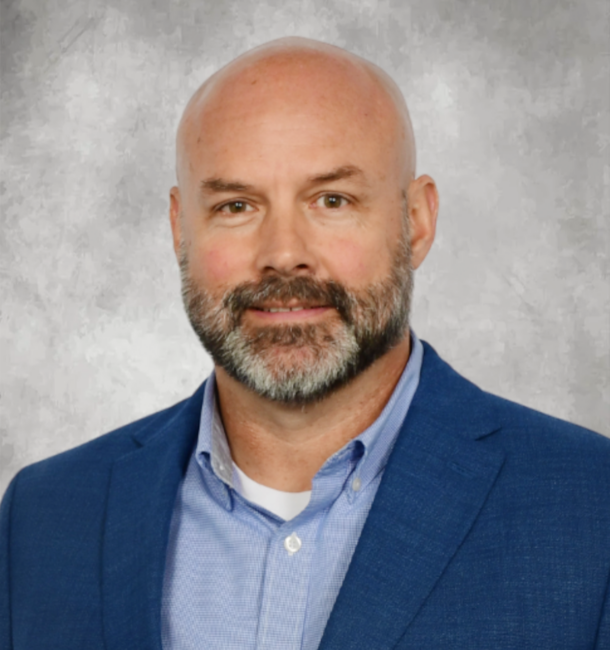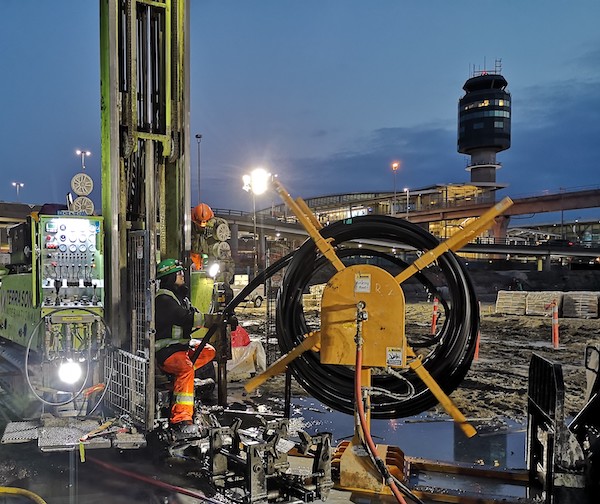The Plastics Pipe Institute, Inc. (PPI) announced today that its Building & Construction Division (BCD) has elected Bill Melvin of Legend Valve (Auburn Hills, MI) as Division Chair and Jim Paschal of Aquatherm (Lindon, UT) as Vice Chair. Melvin, who will also represent the division on the PPI Board of Directors for the next two Read more
PPI

The Plastics Pipe Institute, Inc. (PPI) announced today that its Building & Construction Division (BCD) has elected Bill Melvin of Legend Valve (Auburn Hills, MI) as Division Chair and Jim Paschal of Aquatherm (Lindon, UT) as Vice Chair. Melvin, who will also represent the division on the PPI Board of Directors for the next two years, takes over from Joseph Poniatowski of Asahi/America. The changes took effect June 1, 2024. PPI’s BCD focuses on pressure piping materials for plumbing and mechanical applications.

Jim Paschal (left) of Aquatherm, new Vice Chair and Bill Melvin (right) of Legend Valve new Chair of PPI’s Building & Construction Division with Lance McNevin, the engineering director for the division.
Bill Melvin has served on the Management Committee in several roles, including the Communications Committee Chair and Vice Chair. Jim Paschal also serves as Chair of PPI’s Polypropylene Pressure Pipe Steering Committee and formerly served as R&D Projects Chair. That position will now be filled by Rick Stock of Uponor. Brian Conner of Charlotte Pipe and Foundry joins the committee as Codes & Governments Affairs Committee Liaison.

Rick Stock, Uponor
Adam Grier of iNOEX serves as the Communications Committee Chair, and also as Chair of the PPI Umbrella Marketing Committee. Jason McKinnon of Viega LLC serves as the PPI Education Committee Chair and also as the BCD Education Chair, a position he has held for more than eight years. Forest Hampton III of Lubrizol continues as Advisory Council Liaison & Strategic Planning Chair.
According to Lance MacNevin, P. Eng., director of engineering for PPI’s Building & Construction Division, “PPI’s management committee members provide significant guidance to staff on topics from research, codes and standards to education and advocacy. These new leadership positions solidify their continued commitments to PPI and the piping industry. We are grateful for the volunteer service of these dedicated members.”

Brian Conner, Charlotte Pipe and Foundry
PPI is the major North American trade association representing the plastic pipe industry. The Building & Construction Division represents plastic pressure piping materials such as CPVC, HDPE, PEX, PE-RT, PP-R, and PP-RCT.
More information can be found at https://plasticpipe.org/buildingconstruction
Irving, Texas and Springfield, Ill. — The Plastics Pipe Institute, Inc. (PPI) and the International Ground Source Heat Pump Association (IGSHPA) announced a Memorandum of Understanding (MOU) that will advance the benefits that both organizations provide to the geothermal exchange industry. David Fink, president, PPI and Jeff Hammond, executive director IGSHPA, made the joint announcement Read more
Irving, Texas and Springfield, Ill. — The Plastics Pipe Institute, Inc. (PPI) and the International Ground Source Heat Pump Association (IGSHPA) announced a Memorandum of Understanding (MOU) that will advance the benefits that both organizations provide to the geothermal exchange industry. David Fink, president, PPI and Jeff Hammond, executive director IGSHPA, made the joint announcement virtually from their respective headquarters.
The purpose of the geothermal heat pump industry is to promote a sustainable and decarbonized future across the globe through the adoption of geothermal as the cleanest, most efficient heating and cooling technology.

Established in 1950, PPI is the non-profit North American trade association representing the plastic pipe industry and its members through research, education, technical expertise, and advocacy. Founded in 1987, IGSHPA is a non-profit, member-driven organization established to advance ground source heat pump (GSHP) technology on local, state, national, and international levels.
“For more than 70 years, PPI and our members have focused on the development of plastic pipes and fittings which are the vital connection to the earth and bodies of water for geothermal exchange systems,” Fink stated. “We have always sought ways to work with other like-minded groups to amplify the benefits to the industry. Our work with IGSHPA has been highly rewarding, and we are looking forward to doing even more.”
“This is a very exciting time in the ground source heat pump industry,” said Hammond. “In 2020, IGSHPA became an independent non-profit, no longer part of Oklahoma State University. We see utilities, building owners, governments, and many others recognizing that ground source (geothermal) systems are the best technical solution for reducing energy costs and carbon emissions for heating and cooling buildings. The geothermal industry needs sound technical leadership and guidance and IGSHPA is striving to meet those needs. The collaboration with PPI couldn’t have come at a better time.”
One of the key components of the MOU is technical development, where PPI and IGSHPA agree to foster technical cooperation by providing opportunities to participate in and comment on proposed standards, guidelines, policies, and position statements on technical subjects, encouraging members in each organization to collaborate on technical committees and task forces, and establishing liaison representatives to key technical committees.
Recognizing the important role that research plays in accelerating the transformation to a more sustainable built environment, PPI and IGSHPA also agree to identify and collaborate in the development of projects related to the design and construction of efficient and long-lasting piping systems for geothermal applications. They will also promote research in areas where results will add to the body of knowledge in conservating natural resources, increasing energy efficiencies and sustainability.
“PPI has enjoyed a close relationship with IGSHPA for a number of years,” stated Lance MacNevin, P. Eng., director of engineering for PPI’s Building & Construction Division (BCD). “IGSHPA’s scope of work related to geothermal exchange systems is very much in line with PPI’s scope of work. Since becoming a member of IGSHPA in 2008, I have benefitted from the resources made available to their members and have seen how PPI’s input specifically related to plastic piping materials can assist IGSHPA members. Several PPI member firms are also members of IGSHPA.”
Part of PPI’s mission is to educate the geothermal industry about correct usage of plastic piping materials HDPE, PEX, PE-RT, and PP. “It is important that geothermal engineers have access to accurate information about these pipe materials. There are ideal applications for each of these materials, when utilized correctly,” MacNevin said. “The MOU with IGSHPA will help to accelerate our goal to deliver accurate and thorough information about these systems, so that the best pipe material can be selected for each application.”
MacNevin said that within his division, the Geothermal Steering Committee focuses on specific industry-related issues. “This group is dedicated just to the geothermal industry that includes helping to update standards and codes. Plus, it publishes documents about the use of plastic piping systems for geothermal applications, and serves as a technical resource for geothermal system designers, with regards to plastic piping technologies.”
Other areas addressed in the MOU include advocacy and publications. In addition to the recent MOU, each organization maintains official membership in the other.
“This Memorandum is certainly very exciting,” MacNevin said. “It clearly defines our goals, outlines the initiatives, and sums up the strong support structure of why and how we have forged this agreement. The collaborative work of IGSHPA and PPI members, based on their years of experience and knowledge, is intended to benefit the geothermal community and, ultimately, the public.”
“The wealth of knowledge contained in both of our organizations is second to none,” Hammond said. “So, we are looking forward to expanding our relationship with PPI to help increase the technical knowledge of the industry.”.
Additional information can be found at https://plasticpipe.org/buildingconstruction or at www.IGSHPA.org/

The American Society of Plumbing Engineers (ASPE) and the Plastics Pipe Institute, Inc. (PPI) today announced a Memorandum of Understanding (MOU) that will advance the benefits that both organizations provide to the plumbing industry. David Fink, President of PPI, and Billy Smith, FASPE, Executive Director/CEO of ASPE, made the joint announcement virtually from their respective Read more
The American Society of Plumbing Engineers (ASPE) and the Plastics Pipe Institute, Inc. (PPI) today announced a Memorandum of Understanding (MOU) that will advance the benefits that both organizations provide to the plumbing industry. David Fink, President of PPI, and Billy Smith, FASPE, Executive Director/CEO of ASPE, made the joint announcement virtually from their respective headquarters. ASPE is the international organization for professionals skilled in the design, specification, and inspection of plumbing systems. PPI is the leading North American trade association representing all segments of the plastic pipe industry.

“For the past 70 years, PPI and our members have embarked on research projects that have led to the creation of many manuals and standards, and influenced codes,” Fink stated. “We have always sought ways to work with other like-minded groups to amplify the benefits to the industry. Our work with ASPE has been highly rewarding, and we are looking forward to doing even more. For example, we will explore how to best educate legislators on issues important to the members of each organization, plus promote mutually beneficial positions during the development and passage of state and federal legislation.”
One of the key components of the MOU is advocacy. Where mutually beneficial, and to the extent allowed by laws and corporate policies, ASPE and PPI will work together on common public affairs goals and ideologies.
Billy Smith stated, “Being the international organization for professionals skilled in the design, specification, and inspection of plumbing systems, ASPE is dedicated to the advancement of the science of plumbing engineering, to the professional growth and advancement of our members, and to the health, welfare, and safety of the public. Having the opportunity to continue our core goals by collaborating with industry partners through advocacy for the benefit of all is a valuable asset.”

“PPI has enjoyed a close relationship with ASPE for a number of years,” stated Lance MacNevin, P. Eng., Director of Engineering for PPI’s Building & Construction Division (BCD). “ASPE’s scope of work related to plumbing and fire protection systems is very much in line with PPI BCD’s scope of work. Since becoming a professional member of ASPE in 2015, I have benefitted from the resources made available to their members and participated in the ASPE Main Design Standards and Legislative Committees. Also, PPI has been registered with ASPE as a continuing education CEU Provider since 2016. This has helped PPI to connect with plumbing engineers through ASPE conferences and Chapter meetings. I encourage more PPI members to join ASPE.”
Part of PPI’s mission is to educate the plumbing industry about correct applications for plastic pressure piping systems using CPVC, HDPE, PEX, PE-RT, PP-R, and PP-RCT. “It is important that plumbing engineers have access to accurate information about these pipe materials. There are ideal applications for each of these materials when utilized correctly,” MacNevin said. “The MOU with ASPE will help to accelerate our goal to deliver accurate and thorough information about these systems, so that the best pipe material can be selected for an application.”
Other areas addressed in the MOU include education, technical activities, and research.
“This Memorandum is certainly very exciting,” MacNevin continued. “It clearly defines our goals, outlines the initiatives, and sums up the strong support structure of why and how we have forged this agreement. The collaborative work of ASPE and PPI members, based on their years of experience and knowledge, is intended to benefit the plumbing community and the health, safety, and welfare of the public.”
“The wealth of knowledge contained in both of our organizations is second to none, so we are looking forward to expanding our relationship with PPI to help increase the technical knowledge of the industry,” Smith said.
Additional information can be found at plasticpipe.org/building-construction or at aspe.org.
